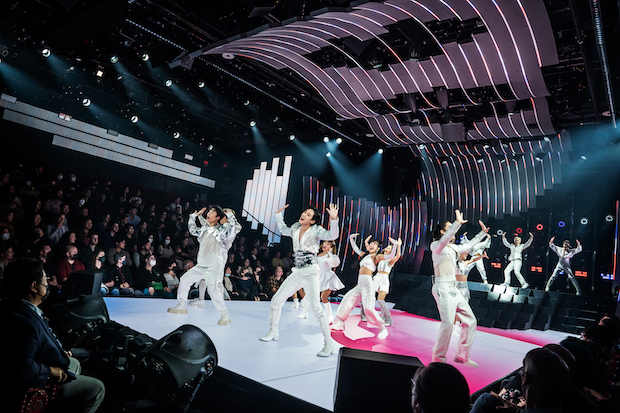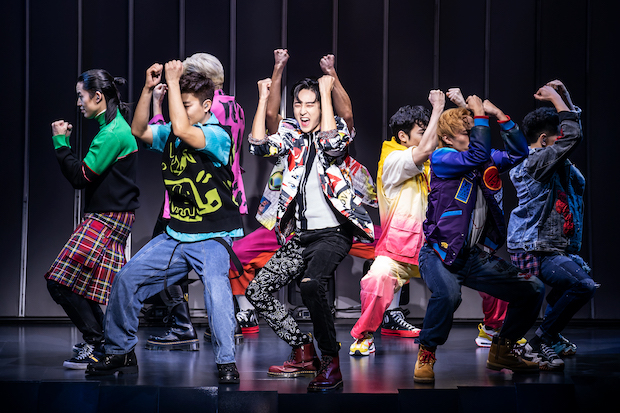Review: KPOP Brings High-Octane Korean Pop and Low-Stakes Drama to Broadway
A formerly immersive look at a Korean music factory stalls in a more traditional production.

(© Matthew Murphy and Evan Zimmerman)
Pop music is a business. So is Broadway. The people who work in both fields might say a lot of high-minded things about dreams and art, but the end goal is to turn a profit. So one might assume that the meeting of Broadway and Korean pop music (one of the most rigorous and lucrative industries of its kind) would make for a happy marriage of super-talented realists who understand the mission brief. Unfortunately, this isn't the case with KPOP, the new musical at Circle in the Square that invites audiences to the American debut of a Korean pop label.
The company, RBY, is the creation of Ruby (Jully Lee), a failed K-pop star who is determined to carve out a space in the industry as a producer. She has spent years coaching the girl group RTMIS (pronounced like the Greek huntress) and the boy band F8. Ruby clearly believes that to create a compelling brand, one need only remove a few vowels, something she has in common with the proprietors of many prestige gyms and overpriced restaurants in this town. Ruby's star solo act, MwE (Luna), gets to keep her "E" — but does she get to have anything else? Why doesn't she have any friends? And why can't she spend more than a couple of hours with her boyfriend (Jinwoo Jung) before being shuffled off to dance practice?
MwE's quarter-life crisis threatens to upend Ruby's carefully choreographed concert, and the backstage drama is secretly captured by Harry (Aubie Merrylees), a flack who fancies himself a documentary filmmaker. The stakes couldn't be higher for Ruby, but we suspect that America will survive without the addition of three more derivative pop acts — and some of these performers might be better off escaping from a quasi-abusive system meant to mold them into perfectly packaged pop products.

(© Matthew Murphy and Evan Zimmerman)
This is the second major production of KPOP following an ambitious immersive staging off-Broadway in 2017. Book writer Jason Kim has radically altered the script since then, in some ways for the better: Ruby, once the wife in a married producing team, is now the sole monarch. Her story of thwarted ambition transformed into a drive to push others to succeed will be instantly recognizable to Broadway audiences, and not just because Lee is giving serious Mama Rose energy. Sadly, the Broadway transfer has mostly resulted in a flattening of the story.
Part of the magic of the off-Broadway run was the feeling of overhearing private conversations and seeing unrehearsed moments as we explored a Korean pop factory (a complete transformation of the A.R.T./New York theater building on 53rd and 10th). If the conflicts and relationships didn't always make sense, we could rationalize it away by assuming that there were things our fellow audience members saw in different rooms to which we weren't even invited — subjects to discuss after the show or to discover in a repeat viewing. Here, we see all and come to realize that there's not much play there.
The original members of F8 still feud with their newest addition, the Korean American Brad (an adorable Zachary Noah Piser). They fret over how their entry into the American market will change them (this leads to the rhyming of "America" with "hysteric-a" and "generic-a" in the song "American (Checkmate)"). A fascinating chunk of the script about plastic surgery and the lengths performers will go to secure a career has been removed like a distinctive mole, leaving the ladies of RTMIS with precious little conflict. And Harry never comes across as much of a threat: We know that Ruby must sign his paycheck (or not) in the end. The flaws of the script have become more obvious under the bright lights of Broadway.

(© Matthew Murphy and Evan Zimmerman)
Musically, however, KPOP has never sounded better. The songs, by Helen Park and Max Vernon, are a loving homage to the genre, which is essentially a more manic version of American and Swedish pop music from the last 20 years, with lyrics in a giddy cocktail of English and Korean. Any of the anthemic power ballads would make respectable national entries in the Eurovision Song Contest. In nearly every up-tempo number, a driving beat undergirds a verse that explodes into an irresistible chorus; this is followed by a rap interlude, rinse and repeat. It's formulaic, but the formula works: You couldn't help but dance to these songs if you were a little drunk at a club (the peppy RTMIS number "Gin & Tonic" hammers home this point). This may be heretical to say in the church of musical theater, but KPOP is at its best when the story surrenders to pure spectacle.
Director Teddy Bergman supports this with a lively staging replete with flashing lights (by Jiyoun Chang), outrageous costumes (by Clint Ramos and Sophia Choi), and inexplicable projections of baronial manors en flambé (by Peter Nigrini). On the already thrust stage of Circle in the Square, set designer Gabriel Hainer Evansohn has built a second platform that thrusts itself even more forward over a trap door, like Jabba the Hut's dais. This presents choreographer Jennifer Weber with plenty of opportunities to create dynamic dances on multiple levels, and she seizes them all. The sound (by Peter Fitzgerald and Andrew Keister) is similarly impressive, squeezing an arena concert into a 700-seat theater.

(© Matthew Murphy and Evan Zimmerman)
None of this would matter without a cast of stars, which KPOP has. The brightest in the constellation is Luna, who brings a powerful voice to an emotionally vulnerable performance. The five women of RTMIS (Min, Bohyung, Kate Mina Lin, Amy Keum, and Julia Abueva) unleash impressive harmonies. And the eight men of F8 (the aforementioned Piser, plus Jiho Kang, John Yi, Joshua Lee, Kevin Woo, Abraham Lim, Eddy Lee, and James Kho) wow us with their perfectly synchronized moves. There's not a weak link in the cast, which features some of the best vocalists and dancers on Broadway right now.
If you want to see them, I suggest you buy a ticket today, because I don't suspect KPOP will be at Circle in the Square for long. Box office has been dismal during previews. Endemic Broadway audiences are likely to turn their noses up at a show with unfamiliar music and a subpar script (they're only willing to tolerate a crappy book if it presents a sanitized biography of a musical artist old enough to have met Ed Sullivan). And legitimate K-pop fans are unlikely to come out to Broadway in significant numbers, opting instead to save their ticket money for when their "idol" comes through New York. Kim's script (which takes itself very seriously) feels at odds with the cotton-candy music and dance routines. All of this spells doom for KPOP, a delightful musical entertainment that is best appreciated as just that, and nothing more.









